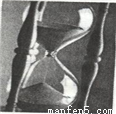
ЁЊLook! Can you see a dog on the sofa? ЁЊYeah. How lovely it is!
A. lie B. lay C. lying D. is lying
C ЁОНтЮіЁПОфвтЃКПДЃЁФуФмПДЕНвЛжЛЙЗе§ЬЩдкЩГЗЂЩЯТ№ЃП-ЪЧЕФЁЃЫќЪЧЖрУДПЩАЎбНЃЁsee sb do sth,ПДЕНФГШЫзіСЫФГЪТЃЌЧПЕїПДЕНЕФШЋЙ§ГЬ; see sb doing sth,ПДЕНФГШЫе§дкзіФГЪТЃЌЧПЕїЖЏзїЕФСЌајадЃЌНјааадЁЃИљОнlookЃЌПЩжЊЧПЕїЖЏзїЕФНјааадЃЌЙЪбЁCЁЃ
| ФъМЖ | ИпжаПЮГЬ | ФъМЖ | ГѕжаПЮГЬ |
| ИпвЛ | ИпвЛУтЗбПЮГЬЭЦМіЃЁ | ГѕвЛ | ГѕвЛУтЗбПЮГЬЭЦМіЃЁ |
| ИпЖў | ИпЖўУтЗбПЮГЬЭЦМіЃЁ | ГѕЖў | ГѕЖўУтЗбПЮГЬЭЦМіЃЁ |
| ИпШ§ | ИпШ§УтЗбПЮГЬЭЦМіЃЁ | ГѕШ§ | ГѕШ§УтЗбПЮГЬЭЦМіЃЁ |
ПЦФПЃКГѕжагЂгя РДдДЃКНЫеЪЁЙрФЯЯи2018НьОХФъМЖИїаЃУќЬтЦРБШжаПМгЂгяФЃФтЪдОэ ЬтаЭЃКдФЖСЕЅбЁ
How could we tell time if there were no watches or clocks anywhere in the world? The sun was probably the worldЁЏs first ЁАclockЁБ, except in the far north, where the Eskimos(АЎЫЙЛљФІШЫ) live. There, itЁЏs dark most of the winter, and light most of the summer. But in most of the world, people have used the sun for a clock. Even today, if you donЁЏt have a clock, you still know that when the sun shines, itЁЏs day, and when itЁЏs dark, itЁЏs night. The sun can also tell you if itЁЏs morning, noon, or afternoon.
People who live near the sea can tell time from the tides. In the daytime, for about six hours, the water rises higher and higher on the beach. And then it goes down and down for about six hours. The same thing happens again at night. There are two high tides and two low tides every 24 hours.
Seamen on a ship learn how to tell time by looking at the moon and the stars. The whole sky is their clock.

In some places in the world the wind comes up at about the same time every day or changes direction or stops blowing. In these places the wind can be the clock.
A sand clock is an even better clock. If you had fine dry sand in a glass
shaped like the one in the picture, you would have what is called an hourglass.
The sand in the hourglass goes from the top part to the bottom part in exactly
one hour. When the hourglass is turned over, the sand will take another hour
to go back again.
1.According to(ИљОн) the passage, there are ____________ ways to tell time besidesЃЈГ§СЫЃЉthe clock and watch.
A. 3 B. 4 C. 5 D. 7
2.The Eskimos in the far north canЁЏt use the sun for a clock because _______________.
A. they know very little about the sun
B. the sun there never goes down in winter
C. itЁЏs too cold for them to go out to watch the sun
D. it has long dark winters and long light summers
3.The underlined(ЯТЛЎЯп) word ЁАtidesЁБ in the passage means _______________.
A. бѓСї B. ГБЯЋ C. КЃаЅ D. ВЈРЫ
4.In which page of a newspaper can you most probably read this passage?
A. News B. Science C. Business D. Advertisement
5.WhatЁЏs the best title for the passage?
A. Different Ways to Tell Time B. Useful Machines to Tell Time
C. The History of the Clock D. The Development of the Clock
1. C 2. D 3. B 4. B 5. A ЁОНтЮіЁП ЪдЬтетЦЊЖЬЮФжївЊНщЩмСЫУЛгаЪжБэКЭжгБэЃЌЦфЫћЕФЗНЪНвВПЩвдИјШЫУЧжИЪОЪБМфЁЃШчЬЋбєЕФзЊЖЏЃЌДѓКЃЕФГБЯЋЃЌЗчЕФБфЛЏЃЌвдМАЩГТЉЕШЁЃ 1. 2. 3. 4. 5.ВщПДД№АИКЭНтЮі>>
ПЦФПЃКГѕжагЂгя РДдДЃКШЫНЬАцАЫФъМЖгЂгяЩЯВсUnit 1 Where did you go on vacation ЕЅдЊВтЪдОэ ЬтаЭЃКЕЅбЁЬт
What you every weekend when you were in Grade 7?
A. will; do B. did; do
C. do; do D. are; doing
B ЁОНтЮіЁП ОфвтЃКЕБФуЩЯЦпФъМЖЕФЪБКђУПИіжмФЉФуЖМзіЪВУДЃПwillЁdoНЋЛсзіЁЃЌЪЧвЛАуНЋРДЪБЬЌЃЛdidЁdoЪЧвЛАуЙ§ШЅЪБЬЌЃЌdidЪЧжњЖЏДЪЃЛdoЁdoЕквЛИіdoЪЧжњЖЏДЪЃЌЕкЖўИіdoЪЧЪЕвтЖЏДЪЃЌетЪЧвЛИівЛАуЯждкЪБЃЌвЩЮЪОфаЮЪНЃЛareЁdoingе§дкзіЃЌЪЧЯждкНјааЪБЬЌЁЃИљОнОфжаЕФЧщОАwhen you were in Grade 7ПЩжЊЃЌетРяЫЕЕФЪЧ7ФъМЖЪБКђЕФЪТЧщЃЌЪЧЙ§ШЅЕФЃЌгІгУвЛАуЙ§ШЅЪБ...ВщПДД№АИКЭНтЮі>>
ПЦФПЃКГѕжагЂгя РДдДЃК2018ШЫНЬАцАЫФъМЖгЂгяЯТЦк Unit1- 2ЕЅДЪЦДаД зЈЬтИДЯА ЬтаЭЃКЕЅбЁЬт
(2014ЁЄЙѓбєжаПМ)This math problem is so hard that I canЁЏt . Please give me some advice.
A. look out it B. work it out C. give it out
B ЁОНтЮіЁПетЕРЪ§бЇЬтШчДЫФбвджСгкЮвЫуВЛГіРДЁЃЧыИјЮввЛаЉНЈвщАЩЁЃlook out аЁаФЃЛwork outЫуГіЃЌВњЩњНсЙћЃЛgive outЗжЗЂЁЃНсКЯОфвтЃЌЙЪбЁBЁЃВщПДД№АИКЭНтЮі>>
ПЦФПЃКГѕжагЂгя РДдДЃК2018ШЫНЬАцАЫФъМЖгЂгяЯТЦк Unit1- 2ЕЅДЪЦДаД зЈЬтИДЯА ЬтаЭЃКЕЅбЁЬт
People under aged 18 should not be allowed .
A. drives B. driving C. drove D. to drive
D ЁОНтЮіЁПФъСфЕЭгкЪЎАЫЫъЕФШЫВЛгІИУБЛдЪаэПЊГЕЁЃbe allowed to do sth,БЛдЪаэзіФГЪТЃЌЙЬЖЈДюХфЃЌЙЪбЁDВщПДД№АИКЭНтЮі>>
ПЦФПЃКГѕжагЂгя РДдДЃК2018ШЫНЬАцАЫФъМЖгЂгяЯТЦк Unit1- 2ЕЅДЪЦДаД зЈЬтИДЯА ЬтаЭЃКЕЅбЁЬт
We could visit the sick children in the hospital to .
A. clean them up B. cheer them up C. call them up D. fix them up
B ЁОНтЮіЁПОфвтЃКЮвУЧПЩвдАнЗУвНдКЩњВЁЕФКЂзгвдЪЙЫћУЧеёзїЦ№РДЁЃ clean upЧхећИЩОЛЃЛcheer up ЪЙЁЁеёзїЃЛcall upДђЕчЛАЃЛfix upаоРэЁЃНсКЯОфвтЃЌЙЪбЁBЁЃВщПДД№АИКЭНтЮі>>
ПЦФПЃКГѕжагЂгя РДдДЃК2018ШЫНЬАцАЫФъМЖгЂгяЯТЦк Unit1- 2ЕЅДЪЦДаД зЈЬтИДЯА ЬтаЭЃКЕЅбЁЬт
You drive your car so fast. ItЁЏs dangerous.
A. wouldnЁЏt B. shouldnЁЏt C. couldnЁЏt D. mightnЁЏt
B ЁОНтЮіЁП ЪдЬтЗжЮі: ОфвтЃКФуВЛИУПЊФЧУДПьЁЃЬЋЮЃЯеСЫЁЃwouldnЁЏtВЛЛсЃЌshouldnЁЏt ВЛгІИУЃЌcouldnЁЏtВЛФмЃЌ mightnЁЏtВЛПЩвдЁЃИљОн ItЁЏs dangerousЬЋЮЃЯеСЫЃЌПЩжЊбЁB.ВщПДД№АИКЭНтЮі>>
ПЦФПЃКГѕжагЂгя РДдДЃКШЫНЬАцАЫФъМЖЯТвЛАуЙ§ШЅЪБКЭЯждкЭъГЩЪБСЗЯАЬт ЬтаЭЃКЕЅбЁЬт
Mr Black __________ in China since five years ago.
A. lived B. has lived C. lives D. is going to live
B ЁОНтЮіЁПОфвтЃКздДгЮхФъжЎЧАЃЌMr BlackОЭвбОзЁдкжаЙњСЫЁЃИљОнЪБМфзДгяsince five years agoПЩжЊЃЌгУЯждкЭъГЩЪБЃЌЦфНсЙЙЪЧhave doneЕФаЮЪНЁЃИљОнЬтвтЃЌЙЪбЁBЁЃВщПДД№АИКЭНтЮі>>
ПЦФПЃКГѕжагЂгя РДдДЃКИЃНЈЪЁСњбвЪа2018НьОХФъМЖЪЪгІадСЗЯАгЂгяЪдОэЃЈШ§ЃЉ ЬтаЭЃКЕЅбЁЬт
Jim, your vegetables, because balanced diet is important.
A. eat up B. drink up C. clear up
A ЁОНтЮіЁПОфвтЃКМЊФЗЃЌАбФуЕФЪпВЫГдЕєЃЌвђЮЊОљКтЕФвћЪГКмживЊЁЃПМВщЖЏДЪЖЬгяБцЮіЬтЁЃeat upГдЙтЃЛB. drink upЭДвћЃЛC. clear upДІРэЁЃvegetablesЪпВЫЃЌЪЧЪГЮяЃЛИљОнОфвтгяОГЃЌПЩжЊeat upКЯКѕОфвтЃЌЙЪбЁAЁЃВщПДД№АИКЭНтЮі>>
АйЖШжТаХ - СЗЯАВсСаБэ - ЪдЬтСаБэ
КўББЪЁЛЅСЊЭјЮЅЗЈКЭВЛСМаХЯЂОйБЈЦНЬЈ | ЭјЩЯгаКІаХЯЂОйБЈзЈЧј | ЕчаХеЉЦОйБЈзЈЧј | ЩцРњЪЗащЮожївхгаКІаХЯЂОйБЈзЈЧј | ЩцЦѓЧжШЈОйБЈзЈЧј
ЮЅЗЈКЭВЛСМаХЯЂОйБЈЕчЛАЃК027-86699610 ОйБЈгЪЯфЃК58377363@163.com